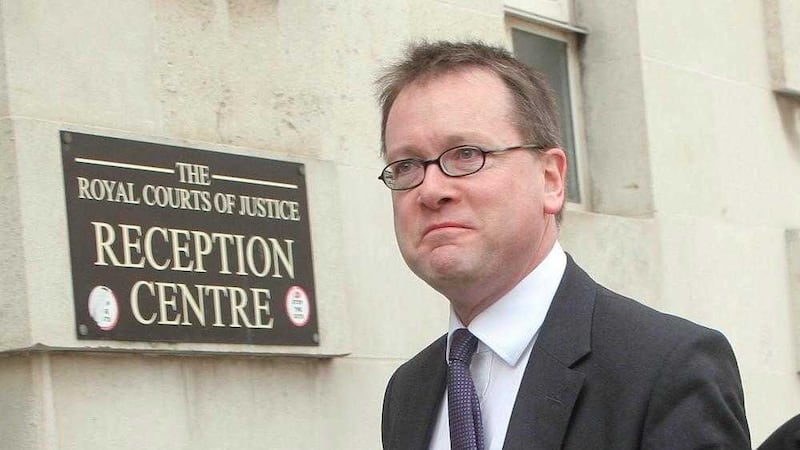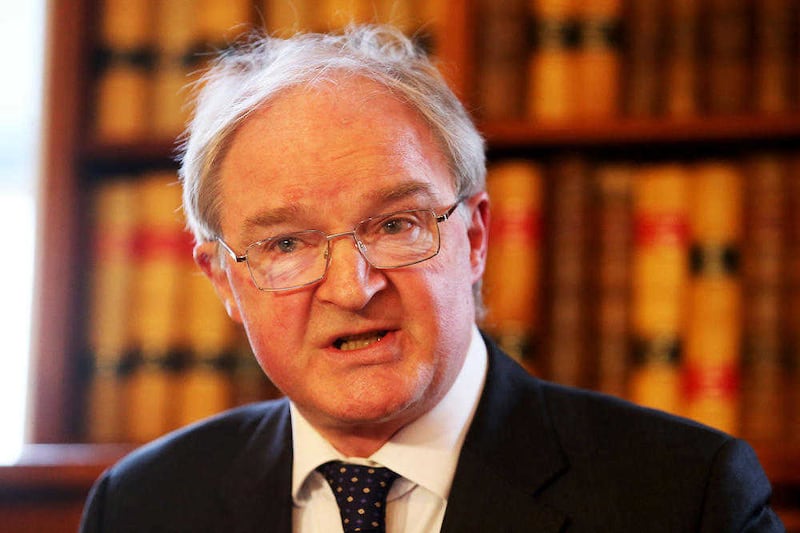A SERVING policeman who tried to arrest one of Northern Ireland's most senior judges acted with flagrant illegality, the Attorney General has claimed.
John Larkin argued that Thomas Anthony Carlin's approach to Lord Justice Gillen was an unreasonable and inexcusable disruption of proceedings.
The Attorney General is prosecuting Mr Carlin for contempt of court, with the 43-year-old facing possible imprisonment if found guilty.
Amid extraordinary scenes at the High Court in Belfast on Monday, the PSNI officer repeatedly claimed he was being denied a fair trial and being subjected to a malicious prosecution.
At one stage Lord Chief Justice Sir Declan Morgan ordered a group of his supporters to be ejected from the public gallery after they stood up to back his allegations.
Sir Declan said: "I'm removing these people for disrupting the process rather than taking action against them."
Mr Carlin's alleged contempt of court came at the end of a ruling in a house repossession case last month.
He had been representing himself in the legal battle with Santander bank over a property in Co Antrim.
At the end of that High Court hearing he allegedly got up and moved towards the bench, claiming he was going to arrest Lord Justice Gillen.
Security and court staff intervened before he was led from the courtroom.
He was arrested on suspicion of two counts of common assault, but subsequently released without charge.
The Police Ombudsman has also launched an investigation.
Mr Carlin is alleged to have interrupted proceedings without justification, refused to resume his seat, approached the presiding judge, threatened to arrest him without lawful excuse and physically interfered with a court tipstaff.
He has rejected offers of legal representation and declined to apologise for his actions.
As the case against him got underway, Sir Declan cautioned he was potentially exposed to a sentence of imprisonment.
The policeman replied by telling the Lord Chief Justice, sitting with Mr Justice Horner, that he did not understand or consent to the proceedings.
Mr Carlin, who repeated demands for a trial by jury, claimed: "There's no independent tribunal, therefore this is not a court of record."
But dismissing that assessment, Sir Declan responded: "Your submission is nonsense."
Interjections continued throughout the hearing, with Mr Carlin at one point arguing that both judges and the Attorney General should stand down from the case.
He also contended: "Lord Justice Gillen has used his judicial influence to deflect determination away from criminal actions for which I arrested him."
The judiciary in Northern Ireland cannot provide him with a fair trial because it has a vested interest in the outcome, he claimed.
However, after being told that the public was watching, Sir Declan retorted: "I know you're very fixated with the question of attention, but we are going to deal with this case on the basis of facts."
A recording of the incident with Lord Justice Gillen was then played in court.
On the tapes Mr Carlin was repeatedly heard to tell the judge he was under arrest, and accuse him of misconduct in public office.
The Attorney General submitted: "He transformed his disappointment (at the outcome) into a suspicion that some criminality had occurred.
"I was quite prepared to accept Mr Carlin wasn't acting in bad faith, but that doesn't take away from the flagrant and obvious illegality of what he was doing."
All Lord Justice Gillen had done, according to Mr Larkin, was deliver a judgment which the PSNI officer profoundly disagreed with.
"Mr Carlin takes the view he had properly exercised a power of arrest," the Attorney General said.
"The short answer is he didn't, he didn't come remotely close to exercising a valid power of arrest."
He added: "The evidence discloses a clear intention to disrupt court proceedings, and there's no lawful excuse for the disruption."
As the hearing developed, Mr Carlin confirmed he wanted to give evidence but sought more time to prepare, claiming his attention to date had been focused on constitutional issues.
Following deliberations the judges agreed to adjourn until later this week.






